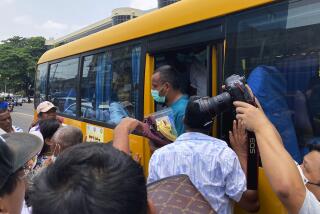Fewer Political Inmates, Chinese Official Claims
- Share via
BEIJING — A senior prison official said Friday that the number of political prisoners in China has been reduced by nearly half since 1989, when hundreds of people were rounded up and jailed as “counterrevolutionaries” after the bloody army crackdown on pro-democracy demonstrators in Tian An Men Square.
In an unusual meeting with Western reporters, the high-ranking prison administrator said Chinese prisons now hold 2,679 inmates charged with political crimes, down from more than 5,000 at the end of 1989.
The official said prominent political prisoner Liu Gang, a former physics student active in the 1989 demonstrations, would be released as scheduled in June after completing a six-year sentence for “conspiracy to subvert the government.”
Regarding dissident Wei Jingsheng, who dropped out of sight last spring after being detained by Beijing Public Security Bureau agents, the official said: “I can only tell you he is not in prison.”
Asked about the whereabouts of Wei, a longtime pro-democracy advocate who has been nominated for the Nobel Peace Prize by several international rights groups, the official smiled and said, “No comment.”
The meeting with journalists came just before the release of a U.S. report that is expected to be highly critical of Chinese human rights practices.
International human rights organizations dispute the claim that China is holding fewer political prisoners. They say Beijing simply reclassified many political prisoners as common criminals or sentenced them, without trial, to “re-education through labor” camps.
Questioned on this point, the senior prison official said only that “less than 200,000” Chinese serve in such camps.
In the regular prison system, the official said, there were 1,285,000 inmates in 690 prisons at the end of 1994. Fewer than one prisoner in 500 is charged with “counterrevolutionary crimes,” which he defined as “acting with the intent to subvert the government and sabotage national security.”
However, in Tibet, which has an underground independence movement, the ratio of political prisoners is much higher. In one Tibetan prison with 1,000 inmates, about 200 prisoners were charged with “counterrevolutionary crimes,” the official said.
A detailed prison code, signed into law Dec. 30 by President Jiang Zemin, guarantees privileges such as family visits and protects inmates from torture or abuse at the hands of guards.
In the past, the official said, 10 to 20 prison officials a year were convicted of torturing or mistreating inmates. Those serving in labor camps are not yet covered by the new prison code.
In another important development related to China’s vast penal system, the official said talks with the International Committee of the Red Cross to permit independent visits to prisons and interviews with inmates had stalled over questions of Chinese sovereignty.
The possibility of Red Cross prison visits--first raised in November, 1993--has been regularly held up by Chinese officials as an example of progress in human rights.
But Friday, the senior prison official said the Red Cross’ demands for private audiences with prisoners and independent interpreters made the proposed visits “hardly feasible.”
More to Read
Sign up for Essential California
The most important California stories and recommendations in your inbox every morning.
You may occasionally receive promotional content from the Los Angeles Times.













